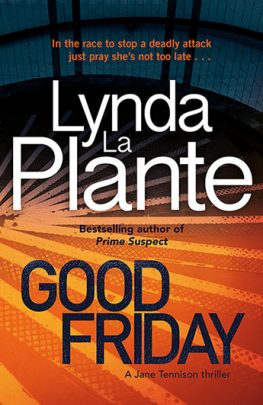Good Friday proves Jane Tennison is as good on page as on screen

I was really keen to read and review Good Friday, by Lynda La Plante as I am presently viewing Prime Suspect on TV. What could be better than a television series than a book itself, especially one following the series?
Jane Tennison is the plain clothes young detective who stars in both. However, the television production has clouded my vision and I cannot get the gorgeous, shapely, huge blue eyes, long lashes of the early 1970s ambitious but down-trodden Jane, from Prime Suspect, out of my mind. And yes, this is the first book I have read by Lynda La Plante.
Good Friday is set in 1976 and is a very smooth transition and continuation of police lady Jane Tennison, strong, observant, but mostly quiet in the face of adversity from her own work colleagues in a male-dominated world of the 70s that extended to every branch of the police force and way beyond.
This is not going to deter Jane who lives, (at least at the start), in police-provided quarters. Her mother continues to be painful and over-protective and Jane is a contrast to her perfect sister, (happily married of course). Her father is a saving. sympathetic, grace to Jane in this immediate scenario and only too willing to assist her in finding her own mortgaged but independent flat.
Jane has ambitions in wanting to join the ‘Fly Squad’ which works out of Scotland Yard. Her then-boss partially accommodates her and moves her very willingly to the ‘Dip Squad’ by convincing her this is one step away from where she would like to be.
What an apt an intriguing name, the ‘Dip Squad’ (petty, but often organised, theft and pick pocketing squad)) and yes, it was called just that in the 1970s and beyond. Jane is patronised by male counterparts but shines through by her fresh approach of ‘female eyes’.
Very early in this squad, poor Jane is exposed to a quite a graphic and horrific sex scene involving a very much underage girl. She bravely carries on and is required to give a full report the next day.
But this is only the beginning.

A major bomb explodes at Covent Garden, a station which is part of London’s underground. Jane is at the forefront. I have to give the author La Plant lots of credit here as this is a convincing scene and sequel of the whole of the following doubtful but at the same time plausible, exciting and almost realistic events.
All within a few days Jane is caught up in the newspapers, the Bomb Squad and their forensic team, forensic explosives laboratory and a new flat mate as well. Twice we hear about the IRA’s ‘sleepers’.
To me, the future lacks mystery and intrigue. I am not compelled with empathy for Jane who is continually portrayed as the naïve detective (good-looking and blond as well). Jane also wins just enough brownie points in the1970s policeman’s world not to get herself dismissed. She continually offers flashes of wisdom, often interjecting at the last moment to give valuable (and true) observations. Her artlessness toward her new flatmate Pearl is not convincing, especially for someone who has been warned to be alert.
Enter Natalie Wilde. Natalie herself is a believable character. Jane’s gullibility is not believable and yes, the reader sees where this is heading long before Jane. Still, her quick wittedness and courage may save the day and her own skin or career.
As a reader, I had to ask myself, did the author intend us to see Jane Tennison as a blonde, naïve bimbo? Yes, I think she may have. I was about the same age as Jane in the 1970s and men dominated most of every workplace especially the professional. However, even to the last scene the plot, and the stupid mistakes all round, are too obvious. Of course, we had to have a few power struggles and sex attractions thrown in. After all, that is how it was.
I have to add, thank goodness for Stanley, also from the Dip Squad and whom she had known previously. Poor reflection on Jane that she did not like him.
A wonderful ending by our author. One of unrequited love and so appropriate for another edition of a saga that is so suitable for a television series based on the IRA.
Good Friday, by Lynda La Plante, is available from Dymocks. Click here for details








 Proudly Australian owned and operated
Proudly Australian owned and operated